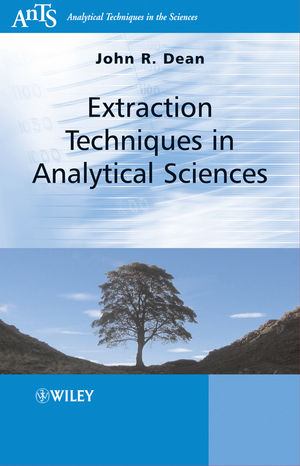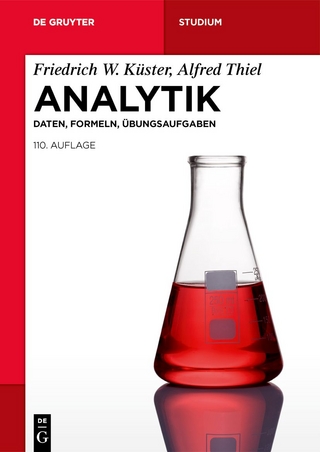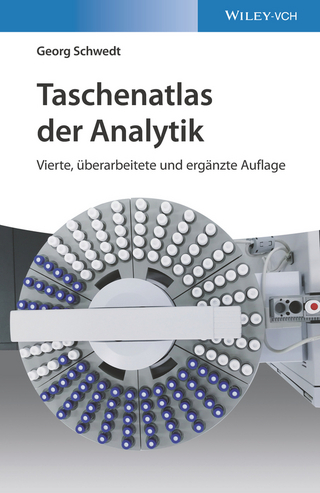
Extraction Techniques in Analytical Sciences
John Wiley & Sons Inc (Verlag)
978-0-470-77284-3 (ISBN)
This book coves one of the most important areas in analytical sciences, extraction techniques for organic compounds in environmental and related matrices. This text discusses all of the key stages for analysing a sample for organic compounds from the initial sampling protocols, the range of different extraction techniques for solid, liquid and air samples through to the final chromatographic analysis. The topics covered include:
Initial steps for solid, aqueous and air sampling.
Extraction techniques for aqueous samples, including LLE, purge and trap, SPE, SPME, SBSE, SDME, membrane microextraction and MPES.
Extraction techniques for solid samples, including Soxhlet, 'Soxtec', Shake-flask, sonication, PFE, MAE, SFE and MSPD.
Extraction techniques for air sampling, including whole air, enrichment approaches and desorption techniques.
Pre-concentration approaches for post-extraction.
Practical aspects for chromatographic analysis (GC and HPLC) of organic compounds.
Quality assurance aspects of analysis.
Health and safety considerations.
Key features include:
Up-to-date information on the latest development in extraction techniques for organic compounds in environmental and food matrices.
Ideal for use as a self-study guide, as the basis of a taught course or guided reading for new 'early-career' researchers.
Includes a guide for the reader to other sources of information.
Extraction Techniques in Analytical Sciences is suitable for undergraduate and postgraduate students, as well as providing an invaluable starting point for individuals undertaking applied research in the fields of analytical, bioanalytical, environmental and food sciences.
The Analytical Techniques in the Sciences series of books provides coverage of all of the major analytical techniques and their application in the most important areas of physical, life and materials science. Each text is presented in an open learning/distance learning style, in which the learning objectives are clearly identified. the reader's understanding of the material is constantly evaluated by the use of self-assessment and discussion questions.
John R. Dean took his first degree in chemistry at the University of Manchester Institute of Science and Technology (UMIST), followed by an M.Sc. in Analytical Chemistry and Instrumentation at Loughborough University of Technology, and finally a Ph.D. and D.I.C in Physical Chemistry at the Imperial College of Science and Technology (University of London). He then spent two years as a postdoctoral research fellow at the Food Science Laboratory of the Ministry of Agriculture, Fisheries and Food in Norwich, in conjunction with the Polytechnic of the South West in Plymouth (now the University of Plymouth). His work there was focused on the development of directly coupled high performance liquid chromatography and inductively coupled plasma-mass spectrometry methods for trace element speciation in foodstuffs. This was followed by a temporary lectureship in Inorganic chemistry at Huddersfield Polytechnic (now the University of Huddersfield). In 1988, he was appointed to a lectureship in Inorganic/Analytical Chemistry at Newcastle Polytechnic (now Northumbria University). This was followed by promotion to Senior Lecturer (1990), Reader (1994), Principal Lecturer (1998) and Associate Dean (Research) (2004). He was also awarded a personal chair in 2004. In 2008 he became the Director of The Graduate School at Northumbria University as well as Professor of Analytical and Environmental Science s in the School of Applied Sciences.
Series Preface. Preface.
Acknowledgements.
Acronyms, Abbreviations and Symbols.
About the Author.
1 Pre and Post-Extraction Considerations.
AQUEOUS SAMPLES.
2 Classical Approaches for Aqueous Extraction.
3 Solid Phase Extraction.
4 Solid Phase Microextraction.
5 New Developments in Microextraction.
SOLID SAMPLES.
6 Classical Approaches for Solid-Liquid Extraction.
7 Pressurized Fluid Extraction.
8 Microwave-Assisted Extraction.
9 Matrix Solid Phase Dispersion.
10 Supercritical Fluid Extraction.
GASEOUS SAMPLES.
11 Air Sampling.
COMPARISON OF EXTRACTION METHODS.
12 Comparison of Extraction Methods.
RESOURCES.
13 Resources for Extraction Techniques.
Responses to Self-Assessment Questions.
Glossary of Terms.
SI Units and Physical Constants.
Periodic Table.
General Index.
Application Index.
| Erscheint lt. Verlag | 2.2.2010 |
|---|---|
| Reihe/Serie | Analytical Techniques in the Sciences |
| Verlagsort | New York |
| Sprache | englisch |
| Maße | 154 x 232 mm |
| Gewicht | 454 g |
| Themenwelt | Naturwissenschaften ► Chemie ► Analytische Chemie |
| Technik ► Umwelttechnik / Biotechnologie | |
| ISBN-10 | 0-470-77284-0 / 0470772840 |
| ISBN-13 | 978-0-470-77284-3 / 9780470772843 |
| Zustand | Neuware |
| Haben Sie eine Frage zum Produkt? |
aus dem Bereich


